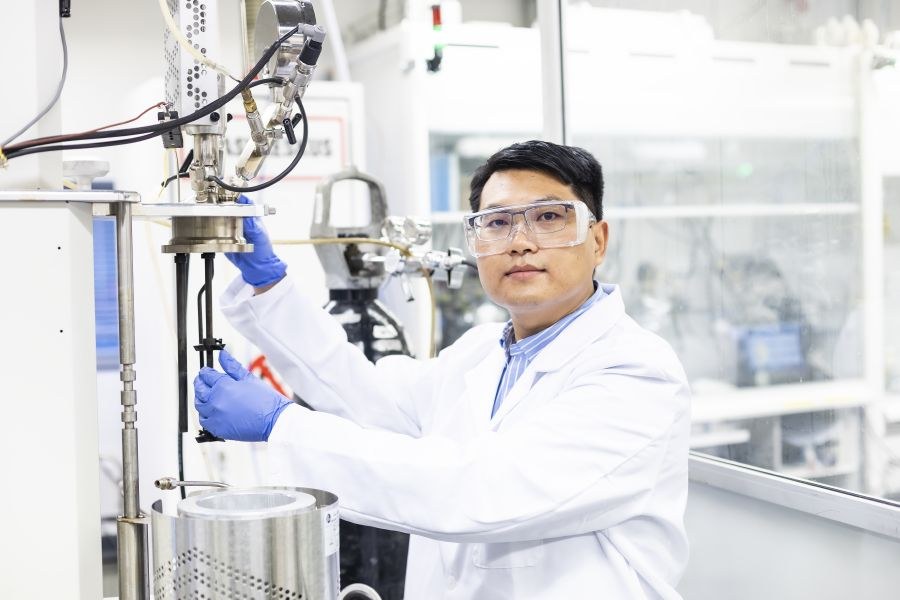Biofuels provide an alternative to electrification

While the widespread electrification of communities is often hailed as a solution to climate change, it comes with its own set of challenges, primarily due to the environmental impact of mining and processing the rare-earth elements that are needed for batteries. Additionally, electrification is expected to depend on renewable energy sources, which are typically variable or intermittent.
According to Jukka Konttinen, a Professor of the Chemistry of Biorefining at Tampere University, it is important to explore other technical solutions for achieving carbon neutrality alongside electrification. We also need to find solutions for balancing the production and consumption of energy and for storing electricity. Konttinen notes that an in-depth understanding of process engineering and chemistry is essential for developing carbon-neutral energy products.
On a quest to find alternatives to electrification, Tampere University offers education and conducts research in areas such as hydrogen technology and biofuel production. Numerous R&D projects are already underway across the Tampere region to advance hydrogen technology.
Henrik Tolvanen, an Assistant Professor of Materials Science and Environmental Engineering, emphasises the importance of environmental welfare. He believes the Degree Programme in Environmental, Energy and Bioengineering provides an excellent foundation for cultivating practical and sustainable expertise in energy engineering.
“Careful planning helps to reduce the footprint of human activity,” Tolvanen says.
Teaching covers the entire energy production chain
At Tampere University, teaching in the field of energy and process engineering focuses on providing students with an overall understanding of energy production, various circular processes, the impacts of renewable energy, and emissions and their treatment methods. The degree programme introduces students to thermodynamics, various energy conversion processes and energy products, such as refined fuels, energy storage systems, and heating and power plants.
“Our students are equipped with the knowledge and skills to perform calculations, dimension the components of energy systems and carry out planning activities. Upon graduation, they possess a comprehensive understanding of energy engineering and the development of the energy sector,” Tolvanen points out.
The degree programme integrates knowledge and methodologies from multiple disciplines, with particularly close collaboration with the fields of electrical engineering, industrial engineering and management, and automation engineering.
In certain applications, thermochemical refining is a viable alternative not only to fossil fuels but also to electrification and renewable energy production, according to Tolvanen.
“At Tampere University, our energy engineering curriculum spans the entire technology chain from the microlevel to the systemic level. The scope of our energy and process engineering modules is unique among Finnish higher education institutions. Our curriculum places a special emphasis on fostering an in-depth of understanding of energy systems,” he says.
Each year, 55 new students are admitted to the degree programme, and approximately 40 master’s theses are completed. The first two years of the programme, leading to a bachelor’s degree, are taught in Finnish, while some of the MSc-level courses are available in English. Around twenty students join the international master’s programme annually. Exchange studies are a popular choice among students enrolled in the programme.
Research promotes the integration of energy sectors
At Tampere University, teaching and research are closely intertwined. Courses can include visits to research groups and laboratories. Some students choose to pursue doctoral degrees and continue their research careers at the University after graduation.
Promoting the adoption of sustainable solutions across the energy sector is among the key goals of energy engineering and biorefining research. Sector integration – meaning that various energy sectors are brought together to balance out each other’s peaks in energy consumption and generation – is one approach to achieving this.
One of the ongoing research projects at the University investigates the potential of pyrolysis oil and renewable fuels of non-biological origins (RFBNOs).
“We have developed pyrolysis oil in collaboration with Valmet and an international research consortium. In the production process, solid plastic waste is heated to produce non-toxic vapours, which are then condensed into a viscous liquid known as biocrude. This biocrude can be further refined to create, for example, transportation fuels,” explains Konttinen.
RFNBOs are produced using renewable energy and refined through electrolysis, a process that splits water into hydrogen and oxygen. The result is synthetic fuels that can be used in vehicles without further processing.

Collaboration benefits companies, students and researchers
In the fields of engineering, collaboration between the University and industry is not only essential but mutually beneficial. Students carry out assignments commissioned by companies and gain valuable work experience through summer jobs, while company representatives deliver guest lectures on campus, enriching the learning experience. For many students, a master’s thesis written for a company serves as their gateway to the professional world.
Tolvanen emphasises that all teaching content is based on a solid theoretical foundation and is included in the curriculum of the degree programme only after careful consideration. Clear competence profiles have been established for the degree programme. These profiles provide a tangible example of the skills and competencies needed in the professional world, making it easier for students to choose their specialisation and focus areas at an early stage of their studies.
“The competence profiles were created in collaboration between teaching staff and companies. We have meticulously analysed the topics we need to teach in order to set our students up for success after graduation. The MSc-level courses have an even stronger professional focus,” Tolvanen says.
In addition to Tampere University, education in energy engineering is offered in Finland at LUT University in Lappeenranta and Aalto University in Espoo. Tampere University stands out for its strong expertise in biorefining technologies and energy systems and for seamlessly integrating education in process engineering into this domain. What further enhances Tampere’s appeal as a place to study is its central location near industrial clusters of process engineering and metal companies, along with its excellent employment rate.
Read more about our research on energy and biorefining
Further information
Jukka Konttinen
tel. +358 400 247 445
jukka.konttinen [at] tuni.fi
Henrik Tolvanen
henrik.tolvanen [at] tuni.fi
Author: Anna Aatinen





